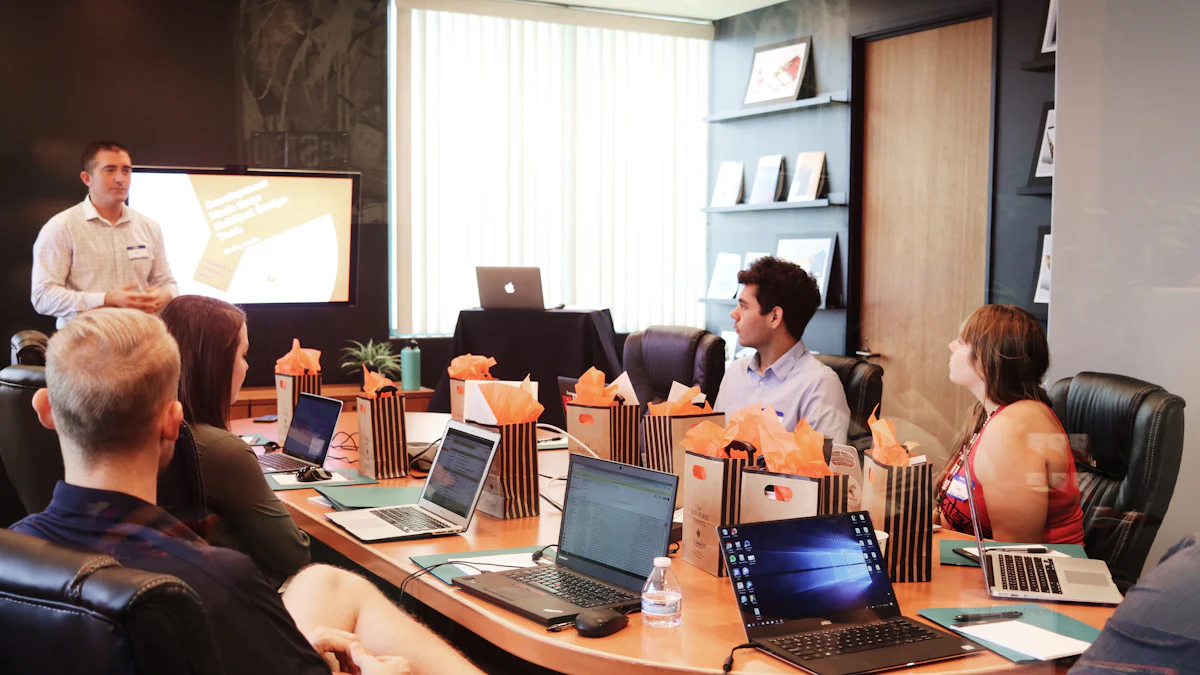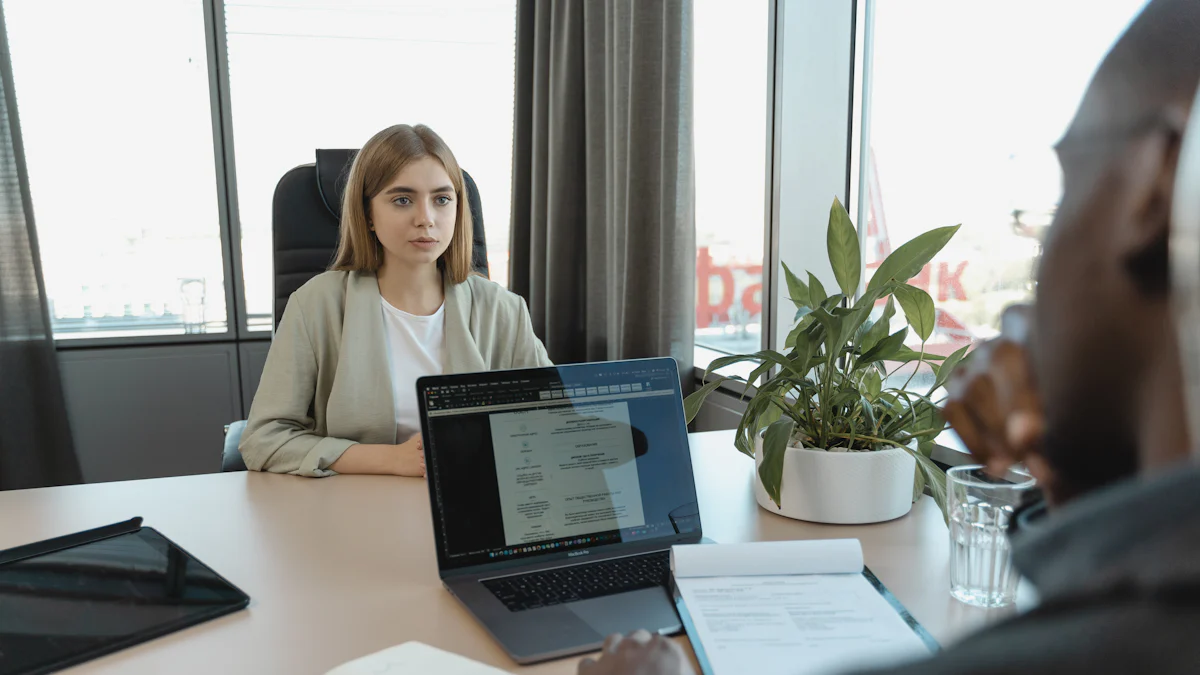Top 20 Peer Interview Questions to Ask in 2025
Try Aihirely for
Smarter Interview Prep
Experience real-time AI support tailored to your Resume.
Boost your confidence and ace every question with
AI Mock Interview.

Image Source: unsplash
Peer interviews are transforming the hiring process. They provide an opportunity to evaluate how candidates might integrate into your team. In fact, 71% of companies now prioritize offering inclusive feedback during hiring, highlighting the growing importance of collaboration. Additionally, 45% of businesses have introduced more assessment phases to their recruitment strategies to ensure they’re selecting the right individuals. Peer interview questions play a crucial role in this process, allowing you to explore a candidate’s ability to collaborate effectively. These questions also uncover how someone communicates and navigates teamwork challenges.
Key Takeaways
-
Peer interviews help find out if candidates fit the team. They check how well people work and talk together.
-
Asking open-ended questions lets candidates share their experiences. This shows their values and how they like to work.
-
Including different team members in interviews lowers unfair judgments. Many opinions make hiring fairer and smarter.
-
It’s important to check if candidates can adapt and understand feelings. These skills help teams succeed in busy workplaces.
-
Getting your team ready for peer interviews is important. Training them to ask good questions creates honest and real feedback.
What Are Peer Interviews and Why Are They Important?

Image Source: unsplash
Definition of Peer Interviews
Peer interviews are a hiring method where candidates meet with potential coworkers instead of just managers or HR representatives. These interviews allow team members to assess how well a candidate might fit into the group. They also give candidates a chance to interact with their future peers, creating a more balanced and realistic hiring process. Unlike traditional interviews, peer interviews focus on collaboration, communication, and shared values.
Benefits of Peer Interviews
Assessing Team Fit and Collaboration
You know how important it is to find someone who can work well with your team. Peer interviews help you evaluate whether a candidate’s work style aligns with the group. Team members can share insights about the role and assess how the candidate might contribute to the team’s success. This process ensures that new hires not only have the skills but also the right attitude to thrive in your workplace.
Evaluating Communication and Interpersonal Skills
Strong communication is key in any job. Peer interviews let you see how candidates interact with others in real-time. Peers, who understand the job’s daily demands, can ask specific questions to gauge a candidate’s ability to express ideas clearly and collaborate effectively. This approach often reveals strengths or weaknesses that might not surface in a traditional interview.
Reducing Bias in Hiring Decisions
Peer interviews bring diverse perspectives into the hiring process. When multiple team members participate, it reduces the risk of one person’s bias influencing the decision. Plus, candidates often feel more comfortable opening up to peers, leading to more honest and insightful conversations. This transparency helps you make fairer and more informed hiring choices.
Peer Interviews in 2025
Adapting to Hybrid and Remote Work Models
With hybrid and remote work becoming the norm, peer interviews have evolved. Virtual platforms now make it easier for candidates to connect with team members, no matter where they’re located. Tools like video conferencing and collaborative software ensure that remote candidates still get a chance to meet their potential peers. This shift has made the process more inclusive and accessible.
Emphasizing Soft Skills in Modern Workplaces
In 2025, soft skills like adaptability, empathy, and teamwork are more critical than ever. Peer interviews focus on these traits by diving into real-life scenarios and past experiences. By asking thoughtful peer interview questions, you can uncover how candidates handle challenges, communicate under pressure, and support their colleagues. These insights are invaluable in today’s fast-paced, collaborative work environments.
How to Formulate Effective Peer Interview Questions
Crafting the right peer interview questions can make or break your hiring process. You want to uncover the traits that matter most for team success while ensuring the questions feel natural and engaging. Let’s dive into the key traits to assess and how to create questions that work.
Key Traits to Assess
Teamwork and Collaboration
Teamwork is the backbone of any successful workplace. You need to know if a candidate can collaborate effectively. Ask questions like, “How do you collaborate best with the rest of your team?” or “What are your strengths and weaknesses when it comes to getting collaborative tasks over the line?” These questions reveal how candidates approach group dynamics and whether they’ll thrive in your team environment.
Communication Skills
Clear communication keeps teams running smoothly. To evaluate this, ask, “What’s important to you when giving and receiving feedback within the team?” or “How would you describe your communication skills?” These open-ended questions help you understand how candidates express themselves and handle feedback.
Adaptability and Problem-Solving
Workplaces change constantly. You need someone who can adapt and solve problems on the fly. A great question here is, “Tell us about a time when another team member was running over a deadline for a joint task and how you handled the situation.” This gives insight into their problem-solving mindset.
Emotional Intelligence
Emotional intelligence is crucial for managing relationships. Ask, “How do you encourage ongoing learning and professional development within the team?” This question highlights how candidates support and uplift their peers.
Best Practices for Crafting Questions
Use Open-Ended Questions
Open-ended questions encourage candidates to share detailed responses. For example, “What motivates you to do your best at work, and why?” sparks meaningful conversations and helps you learn more about their values.
Align Questions with Job and Company Values
When your questions reflect your company’s values, you’re more likely to find candidates who align with your culture. For instance, asking, “What are two or three things your current employer does well and could improve upon?” can reveal how their values match your organization’s.
Avoid Leading or Hypothetical Questions
Avoid questions that hint at the “right” answer or rely on unrealistic scenarios. Instead, focus on real-life experiences. This approach ensures you get authentic and actionable insights.
By focusing on these strategies, you’ll create peer interview questions that truly uncover a candidate’s potential.
Top 20 Peer Interview Questions to Ask in 2025
Questions to Assess Teamwork and Collaboration
Can you describe a time when you worked with a difficult team member? How did you handle it?
This question helps you understand how a candidate navigates challenging team dynamics. It reveals their ability to manage conflict and maintain professionalism. For example, if they share a story about resolving a disagreement by fostering open communication, it shows they value collaboration over confrontation.
How do you ensure everyone’s voice is heard during team discussions?
Teamwork thrives when everyone feels included. By asking this, you’ll learn how candidates encourage participation and respect diverse perspectives. Look for answers that highlight active listening or strategies like rotating speaking opportunities during meetings.
What do you look for in a coworker or team?
This question uncovers what candidates value in their peers. Their response can reveal whether they prioritize qualities like reliability, creativity, or adaptability. It also gives you insight into how they might contribute to your team’s culture.
Questions to Evaluate Communication Skills
How do you approach giving constructive feedback to a peer?
Constructive feedback is essential for growth. This question helps you gauge how candidates balance honesty with empathy. Strong answers often include examples of using specific, actionable language to address issues without damaging relationships.
Can you share an example of how you resolved a misunderstanding with a colleague?
Misunderstandings happen in every workplace. This question lets you see how candidates handle them. Look for responses that show they take responsibility, clarify issues, and work toward a resolution.
How would your current boss describe you?
This question provides a glimpse into how candidates perceive themselves and their work ethic. It also offers clues about their strengths and areas for improvement.
Questions to Gauge Adaptability and Problem-Solving
Tell me about a time when you had to adapt to a significant change at work.
Adaptability is critical in today’s fast-paced workplaces. Candidates might share examples like adjusting to a new software system or taking on unexpected responsibilities. Research from McKinsey shows that organizations with adaptable employees are 1.7 times more likely to outperform their peers.
How do you handle unexpected challenges or tight deadlines?
This question reveals how candidates perform under pressure. Strong answers often include strategies like prioritizing tasks, staying calm, and seeking support when needed. For instance, overcoming deadline pressure might involve reassessing project goals and implementing time management techniques.
Tell me about when you identified a hidden problem that others missed.
Problem-solving requires keen observation and initiative. Candidates might share stories about spotting inefficiencies in workflows or identifying potential risks before they escalated. These examples demonstrate their proactive mindset and critical thinking skills.
Adaptability and problem-solving are essential in modern workplaces. Whether managing change, resolving conflicts, or tackling tight deadlines, these skills drive success. A Deloitte study found that 94% of executives believe agility and collaboration are critical for organizational success.
Questions to Measure Emotional Intelligence
How do you handle conflicts with coworkers while maintaining professionalism?
Conflict is inevitable in any workplace. This question helps you understand how candidates manage disagreements while keeping relationships intact. Look for responses that highlight active listening, empathy, and a focus on finding solutions. For example, a candidate might share how they de-escalated a tense situation by addressing the issue privately and calmly. Emotional intelligence plays a huge role here, as teams with high EI outperform others by 20% in productivity and satisfaction.
Can you share an example of how you supported a colleague during a challenging time?
This question reveals a candidate’s empathy and willingness to help others. Strong answers often include specific examples, like stepping in to assist a coworker with a tight deadline or offering emotional support during a personal crisis. Role-playing during interviews can also showcase how candidates demonstrate empathy and social skills in real-time. These insights help you assess their ability to foster a supportive team environment.
How do you handle stress and maintain performance under pressure?
Stress is part of every job, but how someone handles it can make or break their success. Candidates might share strategies like prioritizing tasks, taking short breaks, or seeking help when needed. Behavioral questions like this allow you to explore their emotional maturity and self-regulation. Teams with emotionally intelligent members often report 21% higher productivity, making this a critical trait to evaluate.
Questions to Assess Cultural Fit
What kind of team environment helps you thrive?
This question uncovers what candidates value in a workplace. Do they prefer a collaborative, fast-paced, or structured environment? Their answer can help you determine if they’ll align with your team’s dynamics. A LinkedIn survey found that 92% of hiring managers prioritize soft skills like adaptability and teamwork over technical skills.
How do you contribute to maintaining a positive workplace culture?
A positive culture boosts morale and productivity. Candidates might share how they celebrate team wins, mentor colleagues, or address negativity constructively. Companies like Zappos have shown that focusing on cultural fit can improve employee retention by 200%.
In what ways do you believe you fit into our company culture?
This question encourages candidates to reflect on your organization’s values. Their response can reveal whether they’ve researched your company and understand its mission. Cohesive teams, where members align with the culture, often see a 21% increase in profitability and productivity.
Questions for Hybrid and Remote Work Scenarios
How do you stay connected with your team while working remotely?
Remote work requires intentional communication. Candidates might mention weekly check-ins, virtual coffee chats, or using tools like Slack to stay engaged. Weekly meetings, for instance, enhance camaraderie and ensure everyone stays informed.
What tools or strategies do you use to collaborate effectively in a virtual setting?
Collaboration tools like Google Workspace or Trello are essential for remote teams. Candidates who can adapt to these tools and suggest innovative strategies demonstrate their readiness for hybrid work environments.
What has been your experience with remote work, and how do you adapt to it?
This question helps you gauge a candidate’s flexibility and problem-solving skills. Strong answers often include examples of overcoming challenges like time zone differences or maintaining productivity without direct supervision. In hybrid settings, adaptability and communication are key traits to assess during peer interviews.
Tips for Preparing and Conducting Peer Interviews

Image Source: pexels
Preparing for Peer Interviews
Train Team Members on Interview Techniques
Your team needs the right tools to conduct effective peer interviews. Start by clarifying the goals of the interview. Are you assessing teamwork, communication, or adaptability? Once you know what to focus on, train your team on essential techniques like asking open-ended questions and recognizing body language cues. Share the interview structure and questions beforehand so everyone feels prepared. This preparation ensures consistency and fairness across all interviews.
Training also fosters collaboration and critical thinking among your team. It helps them feel confident in their roles and creates a culture of continuous learning. When your team knows what to look for, they’ll provide more valuable insights about candidates.
Align Questions with Company Values and Goals
Your interview questions should reflect your company’s mission and values. For example, if collaboration is a core value, include questions that explore how candidates work in teams. Aligning questions with your goals ensures you’re hiring people who fit your culture. It also helps your team focus on traits that matter most for success in the role.
Conducting Peer Interviews Effectively
Create a Comfortable Environment for Candidates
A relaxed candidate is more likely to show their true self. Start by creating a welcoming atmosphere. Use friendly introductions and explain the interview process upfront. This approach encourages open dialogue and helps candidates feel at ease. When candidates feel comfortable, you’ll get a more authentic evaluation of their skills and personality.
Encourage Honest and Constructive Feedback
Honest feedback is key to making informed decisions. Let your team know their opinions matter and will influence the final choice. Encourage them to share both strengths and concerns about each candidate. When peers feel empowered to speak openly, you’ll gather genuine insights that improve the hiring process.
Post-Interview Best Practices
Debrief with the Interview Team
After the interviews, gather your team to discuss their impressions. Start by reviewing notes and scores for each candidate. A structured discussion led by the hiring manager ensures everyone’s voice is heard. This step minimizes bias and helps you evaluate candidates fairly.
Use Feedback to Make Informed Hiring Decisions
Peer interviews provide unique insights into how candidates might fit into your team. Use this feedback to fill gaps in your understanding of the candidate. Focus on how well they align with your team’s culture and values. By combining peer input with other assessments, you’ll make smarter hiring decisions that benefit your entire organization.
Peer interviews are a game-changer in modern recruitment. They go beyond technical skills, helping you assess cultural fit and team dynamics. Research shows that involving peers in hiring leads to better decisions, stronger teams, and reduced turnover. Using the top 20 questions, you can uncover how candidates collaborate, communicate, and adapt. These insights ensure you hire people who truly align with your team. Plus, candidates feel more connected after meeting future colleagues. Start using these strategies today to build a cohesive, high-performing team in 2025!
FAQ
What is the main purpose of peer interviews?
Peer interviews help you evaluate how well a candidate fits into your team. They focus on collaboration, communication, and cultural alignment. By involving team members, you get a clearer picture of how the candidate will contribute to your workplace dynamics.
How do I prepare my team for peer interviews?
Start by training your team on interview techniques. Share the goals of the interview and provide a list of questions. Encourage them to focus on traits like teamwork and communication. Preparation ensures consistency and helps your team feel confident during the process.
Can peer interviews work for remote hiring?
Absolutely! Use video conferencing tools to connect candidates with your team. Encourage open discussions and ask questions about remote collaboration. Virtual peer interviews are just as effective as in-person ones when you use the right tools and strategies.
How do I ensure peer interviews are unbiased?
Involve multiple team members to gather diverse perspectives. Use structured questions and scoring systems to evaluate candidates fairly. Avoid leading questions and focus on real-life experiences. This approach minimizes bias and ensures a balanced hiring decision.
What if a candidate doesn’t perform well in a peer interview?
Don’t rely solely on peer interviews. Combine feedback with other assessments like technical tests or manager interviews. If a candidate struggles, consider whether nerves played a role. Look for potential and alignment with your team’s values before making a final decision.
